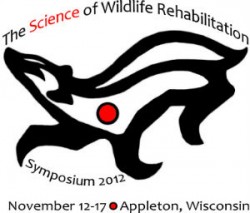 |
| Figure 1: IWRC conference logo |
The compassionate work by wildlife rehabilitators to nurse sick and injured wildlife can contribute to the better understanding wildlife disease phenomenon. Through our presentation, Wildlife Health Event Reporter (WHER): An Online Tool for Monitoring and Recording Wildlife Health Observations, we explained that information about the events rehabilitators respond to and the data they collect for their wildlife care cases are highly desired.
 |
| Figure 2: WHER homepage and URL |
Incorporating these data into the WHER system (www.wher.org) would support a shared wildlife health community goal of establishing a baseline understanding for wildlife morbidity and mortality, which could lead to forecasting future disease outbreaks and identifying areas of concern. The WHER system and data are publicly available for everyone to use and see. (See figure 3 for who would use WHER and how).
In addition, we outlined the benefits WHER can provide to individual rehabbers and wildlife care centers (all are applicable to any other organization):
Strengthen public relations - When contacted by concerned citizens about a wild animal that cannot be helped (e.g. not contained or is already dead), wildlife care centers can direct the public to enter their helpful wildlife health observation into WHER.
Receive report alerts - After subscribing individuals can receive alerts any time a report is contributed to WHER or limit alerts to specific geographic areas (e.g. state or administrative equivalent).
Provide contact instructions - We currently provide and are seeking additional information to share with submitters from external organizations or agencies to provide details about when and how to notify their group directly about the wildlife health observations that are of interest to their agency or research(e.g. the number of animals observed, the location of the health event, and the species involved).
Cross-communication among organizations - For the next disaster that impacts wildlife (e.g. hurricane, oil spill, disease outbreak), WHER can be used to coordinate and manage response and awareness efforts across multiple organizations.
Other benefits - To learn about other WHER benefits, flip through our presentation HERE.
 |
| Figure 3: Target audiences for timely WHER information |
WHER was built to serve as a near-real time wildlife disease surveillance and communication tool, but its effectiveness and future success depends upon collecting a robust dataset from multiple sources, including the public, wildlife rehabilitators, and other organizations/agencies concerned about wildlife disease.
Everyone is Invited to Make a Difference - Share Your Wildlife Health Observations!
Whether you are a wildlife rehabber, wildlife professional, or an everyday citizen concerned about wildlife, your wildlife health observations are valuable and contribute to the collective and growing knowledge base.
Create an account today and start exploring the system and its over 5,000 wildlife health reports. If your organization has a dataset or a live feed of publicly available wildlife health data, or just has questions, contact us at wher@wdin.org. We would love to hear from you!
>>> TO IWRC PRESENTATION [pdf]





No comments:
Post a Comment